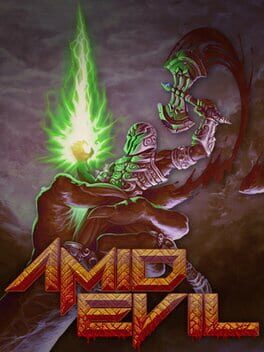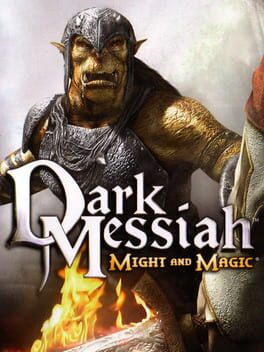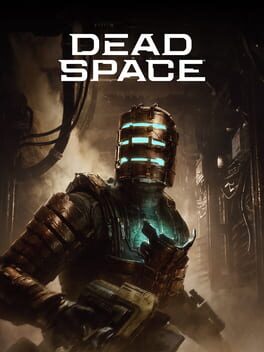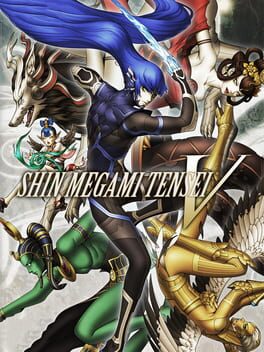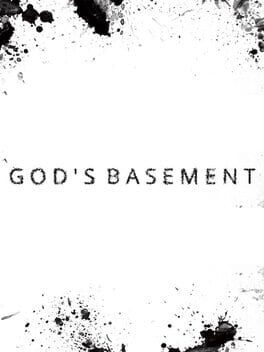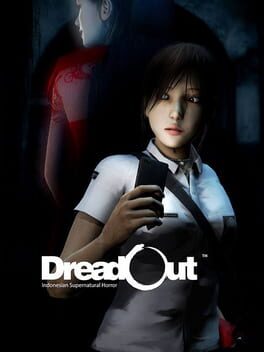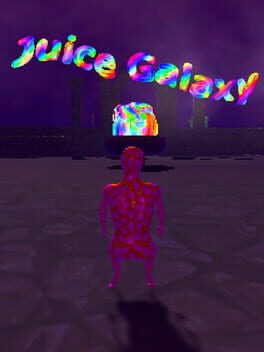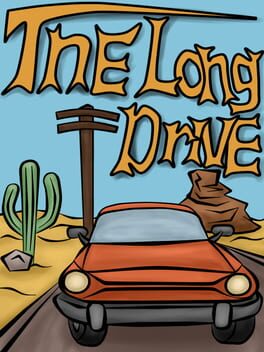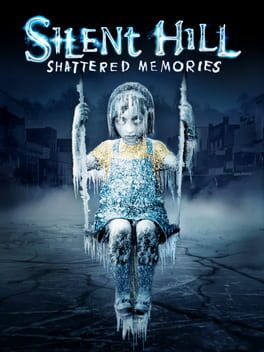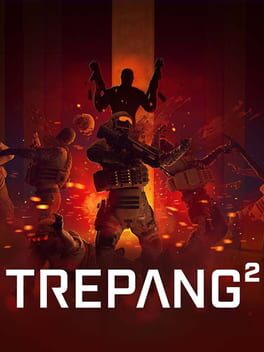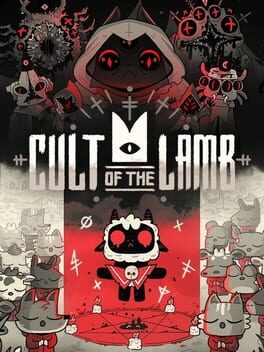Jack_OConnor
2019
A plain and simple boomer shooter that aimed to be one of its peers, in the best way possible. There's not really a lot else to say: everything in it is done extremely well, from the sound design, level design, aesthetics and theming, but it is just another boomer shooter to throw on the ever-growing pile. This one, I think, should just be thrown a little bit more towards the top, and is indeed worthy of being put in a priority list if you want to get through as much of the genre as possible.
An interesting source game that does a lot with its simple mechanics, that beings its physics and how the magic interacts with it (almost to the point of being an immersive sim), but everything around that is kind of unmemorable. The story has some points of intrigue given the twist and choices, but basically the only reason you'd remember it is because of how unapologetically horny it is.
2023
As a fan of the originals, I was already skeptical about this remake even existing in the first place; the only reason you wouldn't play the OGs is because of hardware issues, and even then it's an easy fix. Playing through it all the way only confirms that the only reason you'd do so is out of sheer curiosity or because you literally can't get the first game running.
To be fair to it, it does have some great idea: the circuit breaker mechanic is genius for building tension by making it so it's impossible to progress without deliberately doing something that'll handicap you, bringing Isaac's true personality to the story was always going to be a plus, and they did at least try to tie the new fancy graphics with the limb-focused combat with the whole skin and muscle system.
The detriments far outweigh the positives, though, sometimes counter-intuitively. By bringing Isaac into the focus, now all the other characters in the story are flat, almost to the point of being completely one note, and the mocapped actors' faces only separates the idea that they're in any kind of danger. I swear, some of the actors reacted more like they got told their favorite cereal was out of stock instead of the fact their friends were dying around them. The graphics also get in the way of readability with the necromorphs, too: in the originals, you could tell immediately if you were close to killing one or doing damage to one because it was a simple texture change. Now, there's about four splatter effects for all the gore coming out of one's leg that spews out so much you can't tell if you cut it off until it topples over.
Plus, there are some ideas that seem well-intentioned, but end up dragging the game out for far too long; backtracking the Ishimura was fun for some side content, but ultimately getting clearance and having to go back is way more of a pain than necessary because there's no markers or way to find anything except by following the map, which you can't use doors with while it's opened.
Ultimately, I think the remake was made by people who meant well and were clearly fans of the series, but who came up with too many ideas on what "should" be done with it before thinking about what was practical.
To be fair to it, it does have some great idea: the circuit breaker mechanic is genius for building tension by making it so it's impossible to progress without deliberately doing something that'll handicap you, bringing Isaac's true personality to the story was always going to be a plus, and they did at least try to tie the new fancy graphics with the limb-focused combat with the whole skin and muscle system.
The detriments far outweigh the positives, though, sometimes counter-intuitively. By bringing Isaac into the focus, now all the other characters in the story are flat, almost to the point of being completely one note, and the mocapped actors' faces only separates the idea that they're in any kind of danger. I swear, some of the actors reacted more like they got told their favorite cereal was out of stock instead of the fact their friends were dying around them. The graphics also get in the way of readability with the necromorphs, too: in the originals, you could tell immediately if you were close to killing one or doing damage to one because it was a simple texture change. Now, there's about four splatter effects for all the gore coming out of one's leg that spews out so much you can't tell if you cut it off until it topples over.
Plus, there are some ideas that seem well-intentioned, but end up dragging the game out for far too long; backtracking the Ishimura was fun for some side content, but ultimately getting clearance and having to go back is way more of a pain than necessary because there's no markers or way to find anything except by following the map, which you can't use doors with while it's opened.
Ultimately, I think the remake was made by people who meant well and were clearly fans of the series, but who came up with too many ideas on what "should" be done with it before thinking about what was practical.
2023
The meat of what makes Viewfinder good is in its technology; how the people who made this managed to pull off these optical illusions so well without a hint of stuttering or long loading times is astounding. The problem with that is this makes the rest of the game fall into a sort of tech-demo feel, where all the puzzles are a bit too easy and the story is so barely there that it hardly matters.
If you have any skill with puzzle games, it'll take you at maximum maybe 3 to 4 hours to complete, maybe more when it throws the more abstract ones at you and you get stuck like I did. That's not to say the puzzles aren't good, but for $25, you would really expect more from something like this.
If you have any skill with puzzle games, it'll take you at maximum maybe 3 to 4 hours to complete, maybe more when it throws the more abstract ones at you and you get stuck like I did. That's not to say the puzzles aren't good, but for $25, you would really expect more from something like this.
2021
This is probably the easiest SMT game one could recommend to anyone who wants to branch out from just the Persona series. That's not to say it's perfect, it just has all the necessary beats that show what an SMT game is supposed to be, but only executes some of them flawlessly.
The main thing it gets extraordinarily right is the combat and presentation: everything is clear and easy to understand and satisfying to pull off in the trademark style of "everything in this world is against you so you have to pull out all the stops." The unique models and animations per demon makes collecting and using them satisfying even if they aren't necessarily useful, and the music does a good job of hyping you up even if it gets repetitive pretty quickly.
Where it really drops the ball is the story, and it drops it pretty hard. None of the path representatives have much character or actually do much of anything in the story and could be boiled down to literally just calling them whatever they're supposed to represent. The only reason I remember any names is because I bothered to fuse them, but it's not like the core concept of the game was interesting to begin with.
All in all, I think this is the first game most newcomers to the series should play just to get a feel for if they like it or not. Personally, I enjoyed my time with it, breaking the difficulty into a thousand pieces, and look forward to the changes and doing the same in the Vengeance version.
The main thing it gets extraordinarily right is the combat and presentation: everything is clear and easy to understand and satisfying to pull off in the trademark style of "everything in this world is against you so you have to pull out all the stops." The unique models and animations per demon makes collecting and using them satisfying even if they aren't necessarily useful, and the music does a good job of hyping you up even if it gets repetitive pretty quickly.
Where it really drops the ball is the story, and it drops it pretty hard. None of the path representatives have much character or actually do much of anything in the story and could be boiled down to literally just calling them whatever they're supposed to represent. The only reason I remember any names is because I bothered to fuse them, but it's not like the core concept of the game was interesting to begin with.
All in all, I think this is the first game most newcomers to the series should play just to get a feel for if they like it or not. Personally, I enjoyed my time with it, breaking the difficulty into a thousand pieces, and look forward to the changes and doing the same in the Vengeance version.
2018
A lot of this game is pretty standard and cookie-cutter for an indie horror game, but it's also hard to be too critical of it considering it was made by one dude, this being his first and to my knowledge only project.
I think the worst part about it is the fact it plays more like a puzzle game than a horror game, really. You spend more time wondering what to do in any given situation, trying to figure out what bizarre thing you'll need to do to progress, than you do dealing with any sort of tension. And even then, that mostly bottoms out once you realize you're never in any sort of dangerous situation.
I appreciate the story even if it isn't that original, but the whole thing is just rough.
I think the worst part about it is the fact it plays more like a puzzle game than a horror game, really. You spend more time wondering what to do in any given situation, trying to figure out what bizarre thing you'll need to do to progress, than you do dealing with any sort of tension. And even then, that mostly bottoms out once you realize you're never in any sort of dangerous situation.
I appreciate the story even if it isn't that original, but the whole thing is just rough.
2014
While I myself have never played a fatal frame game, I don't think I need to to recognize that this is essentially just a game from that series done worse. It feels like most of the ideas they had centered around the setting and shoving in Indonesian folklore, because those are the only really interesting parts of the game: everything else is either boring or poorly made.
Part of this is because the game flip-flops between automated sections that are basically cutscenes to putting you in large areas with barely any ghosts to make it scary and half the space is pointless. For example, two of the most notable areas in the game are a mansion and a school, and in both of them there are only maybe three rooms each that have things important to progressing and maybe two ghosts that are constant threats.
Part of this is because the game flip-flops between automated sections that are basically cutscenes to putting you in large areas with barely any ghosts to make it scary and half the space is pointless. For example, two of the most notable areas in the game are a mansion and a school, and in both of them there are only maybe three rooms each that have things important to progressing and maybe two ghosts that are constant threats.
2020
A charming romp of a game that seems like it was entirely based on the designer (who hadn't actually made a game before) saying "Hey, wouldn't it be funny if there was an RPG, but instead of, like, serious combat and quests, you literally just flopped and floated around through everything?"
Not to say anything in the game is bad for any of those qualities; it even seems to embrace it, what with how the characters are designed to just have exaggeratedly ridiculous features like thin legs or bulbous heads, and it just adds to the charm and atmosphere of just chilling out where even the game isn't stressing on blowing your mind.
Not to say anything in the game is bad for any of those qualities; it even seems to embrace it, what with how the characters are designed to just have exaggeratedly ridiculous features like thin legs or bulbous heads, and it just adds to the charm and atmosphere of just chilling out where even the game isn't stressing on blowing your mind.
2023
I'm a really big fan of weird experiment-type games where a bunch of psychos decided to randomly smash two genres together and work their asses off to make it fun, so the fact Hi-Fi managed to pull that off while being funny and having multiple different genres of music in its soundtrack (some of which was made by Nine Inch Nails, for Christs' sake) means it was basically destined to be loved by me as soon as I got around to it.
It's astounding just how deeply they cared about mixing in the combat of a spectacle fighter and a rhythm game to the point every small detail encourages even just moving around the levels to the beat, let alone using every skill and technique you have to make awesome combos and dedicate a good portion of your brain matter just to memorizing the perfect ways to deal with enemies. It was, however, kind of annoying to deal with enemies because the game arbitrarily locked the whole mechanic of parrying behind the halfway mark of the main story.
Everything about this game is just pure passion and fun and, outside of just a tiny bit of jank and odd decisions, it's worth playing regardless if you're a spectacle fighter fan or a rhythm game fan; it's just a good time all around for everybody.
It's astounding just how deeply they cared about mixing in the combat of a spectacle fighter and a rhythm game to the point every small detail encourages even just moving around the levels to the beat, let alone using every skill and technique you have to make awesome combos and dedicate a good portion of your brain matter just to memorizing the perfect ways to deal with enemies. It was, however, kind of annoying to deal with enemies because the game arbitrarily locked the whole mechanic of parrying behind the halfway mark of the main story.
Everything about this game is just pure passion and fun and, outside of just a tiny bit of jank and odd decisions, it's worth playing regardless if you're a spectacle fighter fan or a rhythm game fan; it's just a good time all around for everybody.
2022
I think the best thing about this game is how utterly dedicated it is to whatever it has going on, from the weird mish-mash of German-Chinese sci-fi aesthetics to the puzzles being esoteric as hell to even it calling you a wimp for not playing with its extremely limited inventory.
It deserves props for taking all the right lessons from its inspirations (which I assume are Silent Hill and Lovecraft with maybe a dash of Resident Evil), building itself around the body horror of monsters and escalating the tension of them being a constant threat that you have to work around more than fight through. All around the solid core of what makes most horror stories good: a human desire to see things through because of people you care about, and Signalis definitely makes you care, even if it is out of sheer curiosity as to what's going on.
It's not perfect (I personally think some of the puzzles are too complicated and the final boss just sucks), but that doesn't stop it from being a must-play for anyone who would call themselves a fan of the genre.
It deserves props for taking all the right lessons from its inspirations (which I assume are Silent Hill and Lovecraft with maybe a dash of Resident Evil), building itself around the body horror of monsters and escalating the tension of them being a constant threat that you have to work around more than fight through. All around the solid core of what makes most horror stories good: a human desire to see things through because of people you care about, and Signalis definitely makes you care, even if it is out of sheer curiosity as to what's going on.
It's not perfect (I personally think some of the puzzles are too complicated and the final boss just sucks), but that doesn't stop it from being a must-play for anyone who would call themselves a fan of the genre.
2019
I know a lot of people that have very specific games that they play to turn their brains off or play because it gives their hands something to do while they focus on other things, and I never really understood it until I put 1000km (and stopped) into TLD.
The simplicity and ease of surviving in this game puts it above just a literal idle clicker or something, but once you get any amount of stored resources you could basically ignore any stops; the driving is what you really need to "pay attention to" because the biggest problem you'll face is some part of your car flying off due to the games janky physics.
The real point of this game though is just to give you something to do if you can't sit still with something else: you could listen to a whole book or long video if you wanted to. Hell, I even finished a whole movie while playing this at one point.
The simplicity and ease of surviving in this game puts it above just a literal idle clicker or something, but once you get any amount of stored resources you could basically ignore any stops; the driving is what you really need to "pay attention to" because the biggest problem you'll face is some part of your car flying off due to the games janky physics.
The real point of this game though is just to give you something to do if you can't sit still with something else: you could listen to a whole book or long video if you wanted to. Hell, I even finished a whole movie while playing this at one point.
It's kinda sad that the non-Team Silent games peaked so early, but at least they peaked somewhere. SM is actually quite the enjoyable experience that flips the whole thing about Silent Hill on its head while still holding onto the core of what makes the narratives in Silent Hill so engaging; it even chose to reimagine the very first game just to do so.
It's not without flaws, though: as cool as the psychological profiling is and how much of the game is built around it, to the point even small details in the environment that are meant to catch your eye in a certain way are factors, I find it lacks enough nuance to balance all your choices and will just lock you into one eventually. Plus, as much as I like the idea of not being able to fight back against monsters, the nightmare segments got old very quickly once you realize you can get them over with in like five minutes if you memorize the weird-ass routes they expect you to take under duress.
It's not without flaws, though: as cool as the psychological profiling is and how much of the game is built around it, to the point even small details in the environment that are meant to catch your eye in a certain way are factors, I find it lacks enough nuance to balance all your choices and will just lock you into one eventually. Plus, as much as I like the idea of not being able to fight back against monsters, the nightmare segments got old very quickly once you realize you can get them over with in like five minutes if you memorize the weird-ass routes they expect you to take under duress.
2001
You know, it's extremely easy to think that Silent Hill is good and scary just because literally everyone who's every played it said so, but you never really understand what makes it that way until you play it yourself.
In my eyes, it's like every possible decision and coincidence made during this game's development embodied what one would imagine a game literally possessed or cursed would be. There's just something about how it all looks and sounds and feels like this is a game you shouldn't play, which, for a horror game, is a perfect atmosphere. Even something as minute as just making the world become a little bit darker was worth panicking over for me.
But what really elevates it to something beyond just a good horror game is the story, which is told beautifully. Even if you know the spoilers, nothing really prepares you for how hard it all hits you after everything you've been through. Despite knowing how it all ended, nothing in the game hit me as hard as the last five lines in the game, knowing what had happened and why it all had to.
After playing it, I agree on why its held the test of time for literally 20 years running now. And it's because Silent Hill made us happy.
In my eyes, it's like every possible decision and coincidence made during this game's development embodied what one would imagine a game literally possessed or cursed would be. There's just something about how it all looks and sounds and feels like this is a game you shouldn't play, which, for a horror game, is a perfect atmosphere. Even something as minute as just making the world become a little bit darker was worth panicking over for me.
But what really elevates it to something beyond just a good horror game is the story, which is told beautifully. Even if you know the spoilers, nothing really prepares you for how hard it all hits you after everything you've been through. Despite knowing how it all ended, nothing in the game hit me as hard as the last five lines in the game, knowing what had happened and why it all had to.
After playing it, I agree on why its held the test of time for literally 20 years running now. And it's because Silent Hill made us happy.
2023
You know how a lot of games try to recreate the action and coolness of movies? Like how some games will say they were inspired by John Wick or something? This game is the one I can think of that comes close to that intensity, given how fast it lets you be, how instantly you can react to basically anything, and even how much you don't care about the story.
It's basically everything you could ask for from a modern FEAR game, complete with horror sections that more gross you out and confuse you than actually scare you.
It's basically everything you could ask for from a modern FEAR game, complete with horror sections that more gross you out and confuse you than actually scare you.
2022
It's impressive how cleanly this game is split in half between a management simulator and a roguelike, and how both of these halves are half-baked.
In the beginning, it's not really noticeable; both of the halves are so easy to do that you don't feel pressured to really min-max a certain way and can just do what you want. I only died maybe exactly four times to all five of the bosses, and I never died to a regular enemy unless I was doing a specific challenge.
Where it really drops off is the second half, where it makes you focus more on the management part: the problem with that being that by that point you've probably made your entire base autonomous and you only intervene to level up certain followers to act as keys to continue the roguelike part.
At that point, it feels more like an idle game where you just have to wait to progress, and all the fun drops out.
In the beginning, it's not really noticeable; both of the halves are so easy to do that you don't feel pressured to really min-max a certain way and can just do what you want. I only died maybe exactly four times to all five of the bosses, and I never died to a regular enemy unless I was doing a specific challenge.
Where it really drops off is the second half, where it makes you focus more on the management part: the problem with that being that by that point you've probably made your entire base autonomous and you only intervene to level up certain followers to act as keys to continue the roguelike part.
At that point, it feels more like an idle game where you just have to wait to progress, and all the fun drops out.
